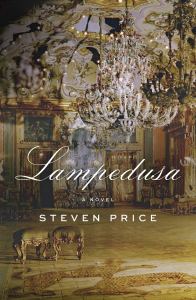Lampedusa by Steven Price
2019: Farrar, Strauss, and Giroux, 336 pages

Review by Mark Spano
Tennessee Williams, not himself a Sicilian but a man who loved one, wrote in an essay introducing his play about Sicilians, “Snatching the eternal out the desperately fleeting is the great magic trick of human existence.” We humans, Sicilian or not, desire to create such time-stopping magic tricks as some form of an answer to the riddle of death. Lampedusa, a new novel by Canadian poet and novelist Steven Price is such a magic trick. Price, who works in both verse and prose, creates a story in a prose style that is imbued throughout with the gifts of a poet. With this combination of gifts, the author has offered us a book of a rare elegance.
Lampedusa is a historical novel that tells of the last days and reminisces of Giuseppe Tomasi di Lampedusa author of the internationally-recognized Sicilian novel The Leopard. This is a book that many of us know well. When I began reading Lampedusa, I asked myself if it was possible to write a novel about the writing of a novel? It seems one is, and Steven Price has.
The challenge of a historical novel is tone. Maintaining voices of the period that are credible to the ear without becoming awkward. Recent history (Tomasi lived from 1896 to 1957), may even be a greater challenge than evoking a deeper, more ancient past. No easy task Price set for himself inventing the voices Lampedusa and his family in mid-Twentieth Century Palermo with many looks back to both world wars. Price’s pitch-perfect prose leads the reader into the very heart of the artist’s doubt, why it is so many of us keep trying to recreate the magic trick mentioned above. “Perhaps,” Price’s Lampedusa thinks out loud for us, “it was the very weakness of the writer that made writing human, and therefore moving, and therefore worth preserving.”
This is not a novel driven by pressing external conflicts. It is a novel of contemplation and interiority. It is a novel about time and how a fleet witchcraft transforms the events of a life into memory, the challenges of so many writers. “What Virgil had feared, Eliot had feared. Homer’s longings had been suffered by Stendhal. No book made any other less necessary.”
Price writes the final days of a man’s life, his memories, his regrets, his losses. “…he too had known people swallowed by the earth, and there had been no design in it, no glimpse of God’s hand at work, only sorrow.” When he writes the mind of a writer, he is stirring. When he writes the mind of a Sicilian, he is astonishing.
“In Sicily, nothing ever is settled,” Lampedusa comments to an old acquaintance. This is the most peculiarly Sicilian of statements. If there is something inherent to the Sicilian soul, it is our fealty to a past, an often muddled and uncertain past.
To say, “I am Sicilian,” is to say, “I remember.” Lampedusa is a memory walk through the heart and soul of a Sicilian who is very familiar to so many of us. Lampedusa wanderings along the streets of Palermo, his early life, his mother, the war, the writing of his novel.
“In the end, he told himself some days, there is only what is done and what is not done. That is a life, that is what remains behind.” Steven Price’s novel has given us a worthwhile glimpse into, “what remains behind.”

